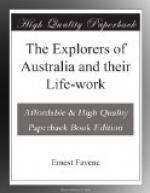As might have been expected the results of the journey are most barren: Wills’s diary is sadly uninteresting, and Burke made only a few scanty notes, at the end of which he writes: “28th March. At the conclusion of report it would be as well to say that we reached the sea, but we could not obtain a view of the open ocean, although we made every endeavour to do so.”
Shortly condensing Wills’s diary, we gather the following account of their route. The first point they intended to reach was Eyre’s Creek, but before arriving at it, they discovered a fine watercourse coming from the north, which took them a long distance in the direction they desired to follow. This watercourse, which McKinlay afterwards called the Mueller, began in time to lead their steps too much to the eastward, in which direction lay its source. They therefore quitted it and kept due north, following a tributary well-supplied with both grass and water. This tributary led them well on to the northern dividing range, which they crossed without difficulty, coming down on to the head of the Cloncurry River. By tracing that river down they reached the Flinders River, which they followed down to the mangroves and salt water. They were, however, considerably out in their longitude, for they thought that they were on the Albert, over one hundred miles to the westward.
[Illustration. Scenes on Cooper’s Creek (After Howitt). 1. Burke’s Grave. 2. Where King was Found. 3. Grave of Wills.]
Having sighted salt water, if not the open sea, they commenced the retreat. Gray and King were the two men who were with Burke and Wills; and for equipment they had started with six camels, one horse, and three months’ provisions. Short rations and fatiguing marches now began to tell, and during the struggle back to the Depot, there seems to have been an absence of that kindly spirit of comradeship that has so often distinguished other exploring expeditions fallen on evil days.
Gray became ill, and took some extra flour to make a little gruel with. For this infringement of rules, Burke personally chastised him. A few days afterwards, Wills wrote in his diary that they had to halt and send back for Gray, who was “gammoning” that he could not walk. Nine days afterwards the unfortunate man died, an act which is not often successfully “gammoned.”
But to bring the miserable story to an end, at last on the evening of the 21st of April, 1861, two months after they had reached the Gulf, they re-entered the depot camp at Cooper’s Creek, where four men had been instructed to await their return, only to find it deserted and lifeless. Keenly disappointed, for though they knew they were behind the appointed time, they had still hoped that some one would have waited for them, they searched the locality for some sign or message from their friends, and on a tree saw the word dig carved. Beneath this message of hope they were soon busy digging, and before long they unearthed a welcome store of provisions and a letter, which ran:—




